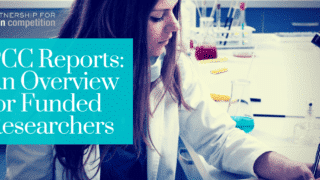Many research projects recommended for PCC funding are complex scientific endeavors requiring multiple years (and phases) of investigation. In these cases, the PCC will prorate funding across the project’s duration. Traditionally, a PI submits a budget that delineates the amount required each year. The first portion of the money is provided immediately, while additional funds are transferred to the institution annually. This is to ensure that initial project phases are progressing successfully before allocating additional funding.
To assess a project’s development, investigators are required to provide an interim report after each year of the project which highlights their progress in terms of the objectives, deliverables, and timelines stated within their grant application. The report also seeks to understand any obstacles encountered, deviations from the original project scope, and an updated timeline, if relevant.
The interim report is reviewed by the PCC’s Scientific Advisory Board during regularly scheduled grant review meetings. Remaining funds are then transferred to projects showcasing their studies are in progress, and on track. In cases where studies are not developing as anticipated, funds may need to be withheld or modified. An example would be if preliminary results shorten the scope of the overall project and subsequent phases will no longer take place (thus eliminating the need for funding). However, instances of this nature are uncommon, and the majority of projects receive on-time transfer of remaining grant funding.
If you have additional questions regarding this topic, or would like to submit a question for the PCC’s Researcher FAQ Blog Series, please email Jenna Celmer at jcelmer@cleancompetition.org




